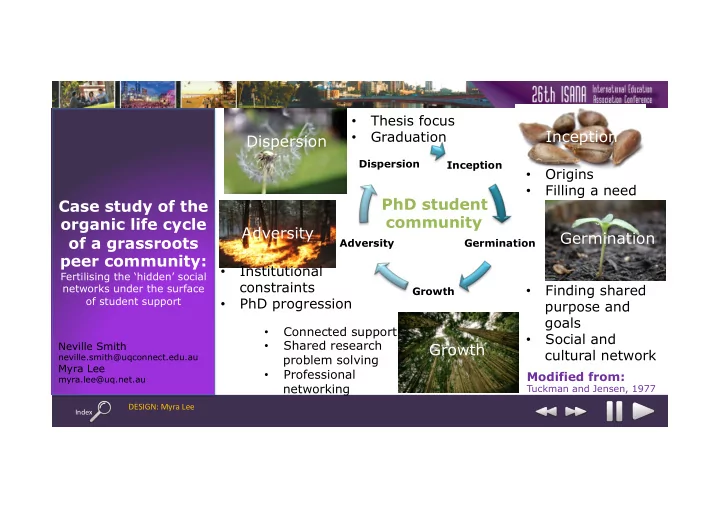

Thesis focus • Inception Graduation • Dispersion Dispersion Inception Origins • Filling a need • PhD student Case study of the community organic life cycle Adversity Germination of a grassroots Adversity Germination peer community: Institutional • Fertilising the ‘hidden’ social constraints networks under the surface Finding shared • Growth of student support PhD progression • purpose and goals Connected support • Social and • Shared research • Neville Smith Growth cultural network neville.smith@uqconnect.edu.au problem solving Myra Lee Professional • Modified from: myra.lee@uq.net.au networking Tuckman and Jensen, 1977 DESIGN:&Myra&Lee& Index&
Enablers Challenges Home away from Time • • home support commitment Similar PhD stages Everyday life • • Case study of the organic life cycle Facebook, emails Formal • • of a grassroots recognition Safe environment • peer community: to learn and Undefined roles • Fertilising the ‘hidden’ social practice networks under the surface Succession • of student support Socio-cultural • exchange Neville Smith neville.smith@uqconnect.edu.au Myra Lee Acknowledgements : We would like to thank our supervisors, Dr M. McMahon and myra.lee@uq.net.au Dr K. McCluskey, for their invaluable and insightful support. DESIGN:&Myra&Lee& Index&
Proofreading Discussing chapters and each other’s getting experiences of Practicing feedback advanced PhD oral stages presentations Case study of the organic life cycle of a grassroots peer community: Sharing Fertilising the ‘hidden’ social practical tips networks under the surface on research of student support tools Learning Neville Smith about each neville.smith@uqconnect.edu.au Agony ‘aunt’ other’s Myra Lee cultures myra.lee@uq.net.au DESIGN:&Myra&Lee& Index&
" " " Myra Lee: myracylee@gmail.com Neville Smith : n.smith4@uq.edu.au (PhD Scholars) Immediate value and potential value You meet others who understand you, talk shop, think together, have fun, get to know each other, feel inspired. You get value from just participating. We call this immediate value. All going well, this activity gives you confidence, new insights, good ideas, new perspectives, unexpected solutions, a new contact. (Beverly and Etienne Wenger-Trayner, 2015) http://wenger-trayner.com/resources/planning-and-evaluating-social-learning/ Our Aim: To form a community of practice comprising domestic and international PhD students to share experiences and ideas. We discovered: A common bond in supporting each other in a safe environment, filled with enthusiastic participation without the need to perform for the academic eye. We experienced : Difficulties trying to maintain the group’s momentum due to institutional restraints and PhD demands. We would have liked: Formal acknowledgement and openness e.g. academic guidance to assist the group’s strategic development. What we would done differently: To overcome the transient nature of our PhD cohort and maintain the essence of the communities of practice idea, while promoting sustainability through the inclusion of new members as older members exit. 1" "
" Find a common driver : Start with the commitment to give purpose to forming a community of practice. Our common purpose was to form a group to practice reading and writing formal academic English. For example, a writing group for journal articles and sharing research methodologies. " Cross-cultural importance: "" Forming a group of international and domestic students provides international students with the chance to mingle with the host culture as opposed to naturally congregating only in international student communities. " All work and no play "" For a community of practice to function successfully, the ‘fun’ factor is an important component. We created pleasant experience through organised social activities. For example, we celebrated cultural diversity, such as sharing food from different cultures, and accommodating families during our gatherings. This brought the group together more tightly. " Assign roles :"" Although our group was organic, assigning roles were important for two reasons: structure and momentum. Designating roles facilitates a distributed responsibility amongst group members and ensures accountability for the participation of members. We set out a meeting agenda for individual presentations of members’ research work experiences; for instance, data collection and analysis, and research approach. """"""""""""""""""""""""""""""""""""""""""""" Assigned roles also assist the functioning of group processes. When the facilitation of the group was left to one or two members, the group’s momentum stalled. Delegating responsibilities to other members would enable the momentum to continue. This addresses the transient nature of the PhD cohort and may potentially stave off the inevitable demise of the group. " " " " Further"reading" Cotterall, S. (2011). Identity and learner autonomy in doctoral study: International students' experiences in an Australian university. In B. Morrison (Ed.), Independent language learning: Building on experience, seeking new perspectives (pp. 57- 72). Hong Kong: Hong Kong University Press. Hingst, Raymond D. (2006). Tuckman’s theory of group development in a call centre context: does it still work? In 5th Global Conference on Business & Economics - Proceedings, Global Conference on Business & Economics. ( 5th Global Conference on Business & Economics, 6-8 July 2006, Cambridge, UK.) 2" "
Recommend
More recommend